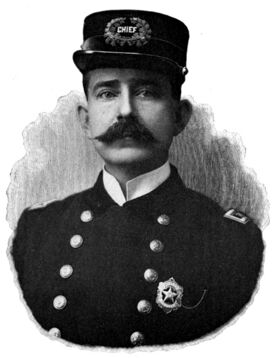Conrad Austin
Conrad Wall "Connie" Austin (born June 20, 1868 in Butler Springs, Butler County; died December 3, 1934 in Birmingham) was a saloon keeper and Chief of the Birmingham Police Department from 1898 to 1901, a period when the position was elected at-large by city voters.
Austin was the son of Davis Austin, one of Birmingham's early patrolmen and later the county jailor, with his first wife, Amanda. He graduated from Birmingham High School and followed his father's footsteps into law enforcement, serving as a deputy under Jefferson County Sheriff Samuel Truss.
Austin resigned from the force to continue his education at the Highland Home Institute in Crenshaw County. After six months he left and enrolled at Howard College in East Lake, but was forced to discontinue his studies due to failing eyesight. He returned to the Sheriff's department, serving again under Truss and his successor, Joseph S. Smith. After six months, he resigned again an opened a saloon at 1720 1st Avenue North.
In 1888 Austin returned to law enforcement, joining the Birmingham Police Department as a private. He resigned from that job after two and a half years. Six months later he returned for duty as a patrolman. In April 1892 he was elected as a constable and took leave from the department to assume that office. He was re-elected in 1896.
In the April 1899 Birmingham municipal election Austin ran successfully for Chief of Police for the City of Birmingham. He was elected alongside Mayor Mel Drennen, who had campaigned on a promise to more strenuously enforce Blue Laws that kept businesses closed on Sundays. He began his term of office on May 15. He was re-elected to a second term in April 1901.
On June 5, 1899 Austin complained aloud to Judge Noah Feagin that he was dismissing cases that should have resulted in criminal convictions. Feagin found him in contempt of court and fined him $10. Austin then urged the judge to increase the fine, which he did, adding that Captain William Weir should take him to jail. Weir declined to do so, saying that Austin was his superior. Feagin instructed Weir that the police were officers of his court and his order should be followed, but Austin left the courtroom. That evening, Feagin's 21 year-old son Jewett appeared at Austin's door , accompanied by John Bradley and followed by two patrolmen. He was admitted to the house and asked whether Austin would apologize. Austin replied that he owed the Judge no apology. It was alleged that Feagin then put his hand in his front pocket, at which time Austin struck him in the face and restrained him. The other officers came in and found a new pistol in Feagin's front pocket. Feagin was arrested and charged with carrying a concealed weapon. Judge Feagin recused himself from the case.
As Chief, Austin announced the Anti-Spitting Law of 1899 and captured the Miller-Duncan gang of murderous safe blowers in March 1900. In February 1901 he personally led raids of suspected gambling dens above the Dude Saloon and the Damon & Lee Livery Stable.
Austin led the department's move into the new Birmingham City Hall that same year, used the expanded offices to institute a more comprehensive system or record keeping. He adopted the "Bertillon System" for recording the physical measurements of criminals, and enrolled the department into the National Bureau of Identification.
During his term, Austin saw the establishment of the Birmingham Police Relief Association in response to the deaths of officers J. Wafe Adams and George Kirkley. He led efforts to organize a State Association of Chiefs of Police and Marshals of Alabama, and promoted the creation of an industrial school for girls.
A biography published in a promotional book in 1902 boasted that Austin had, "not only kept down in complete subjection the outpourings of criminals from other cities, but has convinced the greater portion of that class, that Birmingham and the Birmingham District is not a healthy place for the transaction of their nefarious trades."
After leaving office Austin managed the Commercial Detective Bureau with offices on the fifth floor of the Jefferson County Bank Building. His residence was located at 1025 24th Street North in Druid Hills.
Austin ran unsuccessfully to return to office in the 1907 Birmingham mayoral election. In 1911 he had his own C. W. Austin's Secret Service Agency with offices on the 2nd floor of the Woodward Building. In 1914 he helped investigate corruption in the department in his capacity as a private detective, and claimed credit for the ouster of Chief George Bodeker on suspicion that he had accepted bribes from bordellos and gambling houses. In 1915 his agency had moved to the 4th floor of the Brown-Marx Building, just one floor above the newly-opened Bodeker's National Detective Agency.
Austin later headed the Alabama Law Enforcement Bureau, whose undercover agents were active in suppressing organized labor in the state. In 1921 he wrote to Governor Thomas Kilby to recommend allowing the sale of "non-intoxicating near beers", as permitted by the Volstead Act, under state license.
Austin was a Master Mason, and a member of the Knights of Pythias and the Order of Odd Fellows. He died in 1934 and is buried at Forest Hill Cemetery.
| Preceded by: Thomas McDonald |
Chief of Birmingham Police Department 1899–1901 |
Succeeded by: William Wier |
References
- "He Resented Chief Austin's Criticism of His Father" (June 6, 1889) The Birmingham News, p. 6
- "Chief Austin Makes Two Raids" (February 7, 1901) The Sentinel (Montevallo)
- Ohlander, Marcus (1902) "Conrad W. Austin, Chief of Police" in Historical Souvenir: History: The Birmingham Police Department Birmingham: Birmingham Police Relief Association
- "Will of People to be Expressed Monday: Wide Interest in Democratic Primary." (February 16, 1907) The Birmingham News
- Austin, C. W. (December 19, 1914) letter to the publisher, published January 30, 1915 in The Freeman. Indianapolis, Indiana
External links
- Conrad Austin at Findagrave.com
